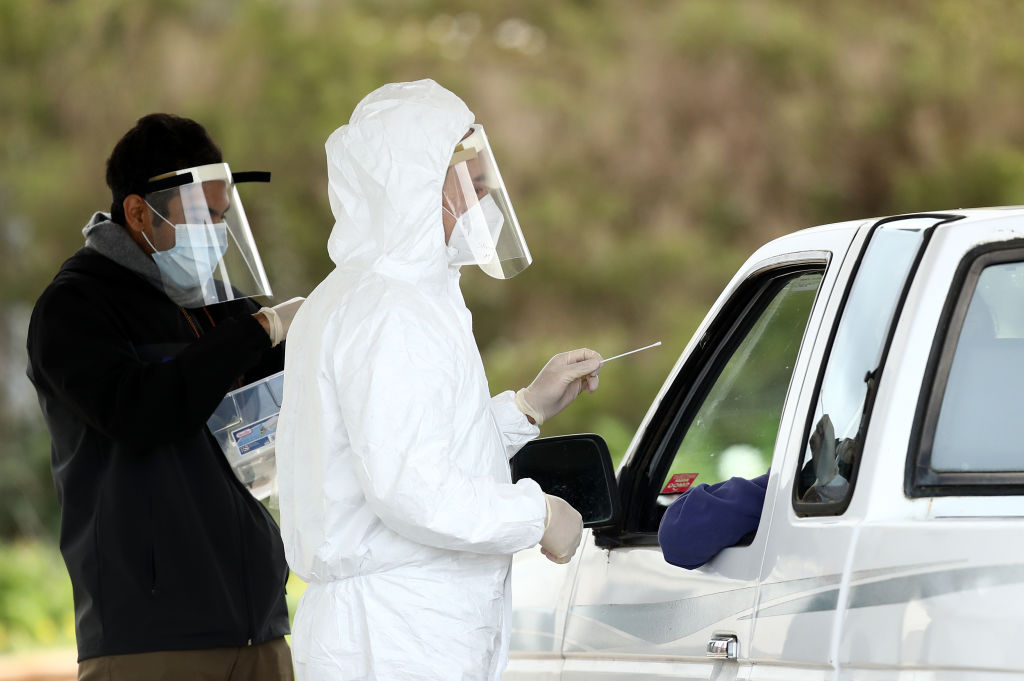California becomes 1st state to endorse coronavirus testing for people without symptoms


A free daily email with the biggest news stories of the day – and the best features from TheWeek.com
You are now subscribed
Your newsletter sign-up was successful
California is changing up who can receive coronavirus testing, becoming the first state to broaden the strict federal guidelines.
Public health officials in the state said Tuesday they are now recommending that asymptomatic people who work or live at places where the coronavirus could spread easily, like prisons or nursing homes, get tested, labeling them "Priority 1."
"California is leading the way," Brandon Brown, an epidemiologist at the University of California, Riverside, told the Los Angeles Times. "We will be able to test more individuals, identify more people with COVID-19, isolate them, and thereby both flatten the curve and prevent the future spread of infection."
The Week
Escape your echo chamber. Get the facts behind the news, plus analysis from multiple perspectives.

Sign up for The Week's Free Newsletters
From our morning news briefing to a weekly Good News Newsletter, get the best of The Week delivered directly to your inbox.
From our morning news briefing to a weekly Good News Newsletter, get the best of The Week delivered directly to your inbox.
The federal guidelines established by the Centers for Disease Control and Prevention list hospitalized patients and health care workers displaying coronavirus symptoms as the primary people eligible for testing, followed by elderly symptomatic patients and those with underlying health conditions. People who do not show any symptoms are a non-priority. While doctors do have a say in who can get tested, hospital administrators have been citing CDC guidelines in order to hold on to tests for the sickest patients, the Times reports.
Last Wednesday, Gov. Gavin Newsom (D) said there was a shortage of testing swabs in the state, and on Monday, Los Angeles County announced it was experiencing a testing backlog. Bob Kocher, a member of Newsom's task force on testing, told the Times while some labs do have shortages of extraction chemicals, "we've come up with good plans to resolve bottlenecks. We have a nice supply." He also said that combined, high-volume labs in the state are able to run more than 80,000 coronavirus tests every day.
A free daily email with the biggest news stories of the day – and the best features from TheWeek.com
Catherine Garcia has worked as a senior writer at The Week since 2014. Her writing and reporting have appeared in Entertainment Weekly, The New York Times, Wirecutter, NBC News and "The Book of Jezebel," among others. She's a graduate of the University of Redlands and the Columbia University Graduate School of Journalism.
-
 Magazine solutions - February 27, 2026
Magazine solutions - February 27, 2026Puzzle and Quizzes Magazine solutions - February 27, 2026
-
 Magazine printables - February 27, 2026
Magazine printables - February 27, 2026Puzzle and Quizzes Magazine printables - February 27, 2026
-
 ‘The forces he united still shape the Democratic Party’
‘The forces he united still shape the Democratic Party’Instant Opinion Opinion, comment and editorials of the day
-
 Trump HHS slashes advised child vaccinations
Trump HHS slashes advised child vaccinationsSpeed Read In a widely condemned move, the CDC will now recommend that children get vaccinated against 11 communicable diseases, not 17
-
 FDA OKs generic abortion pill, riling the right
FDA OKs generic abortion pill, riling the rightSpeed Read The drug in question is a generic version of mifepristone, used to carry out two-thirds of US abortions
-
 RFK Jr. vaccine panel advises restricting MMRV shot
RFK Jr. vaccine panel advises restricting MMRV shotSpeed Read The committee voted to restrict access to a childhood vaccine against chickenpox
-
 Texas declares end to measles outbreak
Texas declares end to measles outbreakSpeed Read The vaccine-preventable disease is still spreading in neighboring states, Mexico and Canada
-
 RFK Jr. shuts down mRNA vaccine funding at agency
RFK Jr. shuts down mRNA vaccine funding at agencySpeed Read The decision canceled or modified 22 projects, primarily for work on vaccines and therapeutics for respiratory viruses
-
 Measles cases surge to 33-year high
Measles cases surge to 33-year highSpeed Read The infection was declared eliminated from the US in 2000 but has seen a resurgence amid vaccine hesitancy
-
 Kennedy's vaccine panel signals skepticism, change
Kennedy's vaccine panel signals skepticism, changeSpeed Read RFK Jr.'s new vaccine advisory board intends to make changes to the decades-old US immunization system
-
 Kennedy ousts entire CDC vaccine advisory panel
Kennedy ousts entire CDC vaccine advisory panelspeed read Health Secretary RFK Jr. is a longtime anti-vaccine activist who has criticized the panel of experts
